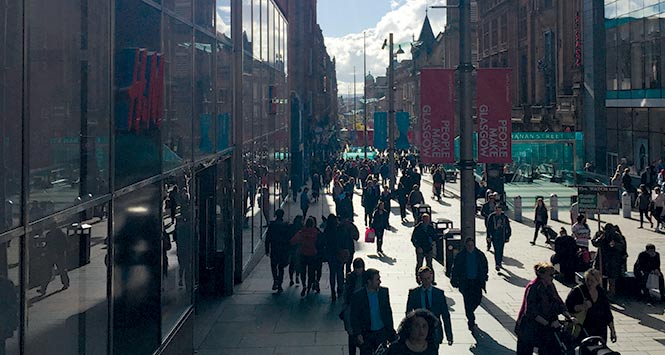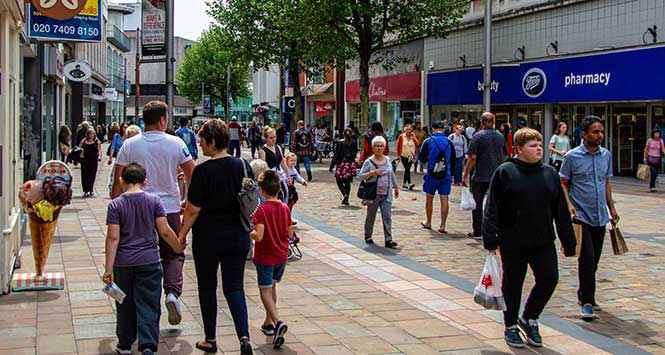Recent weeks have shown that the concept of ‘place’ has become more important to more people than ever before. Can we really be satisfied with the retailing system and the towns we have, once the dust sort of settles from the pandemic?
by Professor Leigh Sparks
The retail system in the UK is broken. It works for quite a lot of people most of the time, but mainly the affluent and the car-borne, though not for all. When it does work, it does so at the expense of both society and local economies. It is not sustainable in the broadest sense and does not meet the obligations we must now accept as necessary for rebuilding our future.
Our towns, places and high streets are broken. We have accepted the ways things have been for many years, in the pursuit of low prices and the often false god of economic productivity. Retailers have become disassociated from their local markets, consumers and places and even more distant from many of the suppliers they rely on. This is especially so in terms of food retailing.
Covid-19 must alter our perceptions and challenge our willingness to accept this ‘bargain’. We deserve better in so many ways.
Now, this is not to say that multiple and large-scale retailing does not have its place – it does. Nor is it to argue that the just-in-time supply system in food failed under the weight of binge-buying ahead of lockdown. The response from many such retailers, producers and supply systems has been impressive and the recovery effective. Consumers have gained and do gain benefit from the operation of large retailers. But do they pay their way, and should they be more responsible (to producers, consumers, suppliers, places, communities) in their dealings?
More fundamentally, should we engineer more of a balance in the system in order to provide properly for more of our population? This is also not just about providing economically, but also socially.
So, what might we want our retail sector to look like?
It needs to be a system that works for all and not just for some. Food banks are not an acceptable component of any advanced economic system. We need an enhanced local focus, reducing dependency on long, complex, supply chains. The pandemic has highlighted the inequality we knew was there but kept wanting to forget about.
Focus on local
Local must be a major focus. This is about local neighbourhoods and places as well as the local supply chains and assets that are required to break our over-dependence on international and distant supply. A renewed focus on community, support and place has been demonstrable in recent weeks. We need to build on this. The plight of many artisan and local producers, unable to supply their normal markets should be a wake-up call. We have great local producers and products and we should be seeking to support them by opening up local markets and focusing on local consumers. We must connect better our producers and our consumers, and this is best done in towns and town centres.
This implies a rebalanced sector with switches from national multiple chains to local and independent operations; from physical to digital taxation; and from a reliance on the car and out-of-town stores to in-town and neighbourhood stores and markets. It suggests a new relationship with quality and sourcing (and in food, our diet) and an underpinning need to enable people to access this physically and economically.
We have proven through the last six weeks or so that previously impossible solutions are not that, and that we can rethink our approach and systems. We cannot go back to what has been failing us generally; we need to be bold and rethink these relationships and redefine what is acceptable.
My focus above has been mainly on food retailing, but the issue is broader than that. If we are serious about supporting ‘the high street’ and town centres, then this is the opportunity to rebalance to focus on what we value and thus what we should be active in encouraging and discouraging; one or the other is not an option.
If we accept that, then what measures could we take to make this happen? Some initial ideas include:
- A rebalancing of taxation between digital and physical retail. Online has expanded during this crisis and many of those who have used online may well continue to use it. We need to rebalance taxation to accept and reflect what has now changed in business operations. If we want physical stores we have to stop taxing them out of business whilst allowing others a free pass at using, but not paying for, common good (such as the roads they currently use for delivery). International tax avoidance should be stopped. This is not to try to end online, but to reflect its true costs and also the changing nature of business.
- Immediate substantial increases in income for ‘key workers’ and those currently marginalised in our economy. These people and jobs (including shop workers) have real value to our economy and society.
- Disincentivise retail components damaging the concept of place and not paying their true social and economic costs e.g. out-of-town car-focused stores. The current lockdown has seen the rediscovery of local and community, often focused around place. Activities that damage place need to be challenged and refocused. Some of this can be done by fair taxation (including abolition of rates for high street independent retailers), reflecting the true economic and social cost (fresh air now trafficis much reduced anyone?). However, there might also be a need to directly challenge rights of operation. If businesses are hurting communities in the broadest sense should they have a right to continue to operate?
- Change the VAT system to reward the reuse of historical and existing buildings rather than as currently happens rewarding new build on often greenfield sites.
- Allied to this there needs to be substantial economic protection and support for independent producers and retailers to encourage their sustainability and growth. If we value the local and entrepreneurial, then we need to support them. We are saying that c-stores and local independents have done a fabulous job in the pandemic; let’s show it afterwards by making the ‘playing field’ rather more level. The proportion of their spend made in local areas is far higher; they are the glue of the social networks we claim to value (as they have shown over the last few weeks).
- Requirements on retailers of all sizes to demonstrate their ‘local’ credentials in terms of procurement and product and service supply. Too often local has been managed (if considered at all) by a few nods to local employment and some pictures of vaguely local producers in store. If we are willing to support local businesses through our taxation and licensing system, then we need mechanisms and measures to demonstrate that localness. This is not only in people, but in products, services, community payback and other measures of local community good that build places rather than extracting value.
- Financial and managerial support should also be provided for local markets on a regular basis, with ‘local’ (and ‘farmers’ and ‘fishers’ for food) being defined terms and a responsibility on local authorities to provide space and opportunity for such markets on a regular basis. Some of this would be physical – as markets are inherently social – but strong encouragement for local collective and community supply is needed, whether physical and/or virtual. This must not be a burden on local authorities that is unfunded but a funded requirement.
None of this denies the important role of mass retailing and production; this is about a rebalancing, not an abolition of the approach. But the retail (especially the food) system has failed us, and no amount of post Covid-19 ‘back to normal’ rhetoric should be accepted. The ‘old normal’ did not supply or nourish the nation in the way it should; we now must be able to feed our country on a sustainable healthy basis and build a sustainable future, focused around towns and place. This will require a radical shift in thinking and operations.
The world has changed. Ending lockdown and returning to the old ways is not an acceptable way forward. We have seen that alternative futures and ways of doing things are possible. We must take this opportunity to change our towns and communities for the better, and it starts with local retailing.
Professor Leigh Sparks is Professor of Retail Studies at the University of Stirling. This article first appeared on Professor Sparks’ blog.




